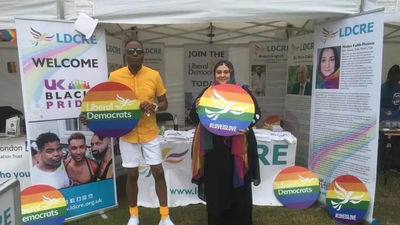At the intersection of race, faith and sexual identity | Nadya Fadih-Phoenix

It has been incredibly hard to complete this blog.
I have contemplated every word, pondered every sentence, and mulled over every paragraph. In the last two weeks I have felt intense anger, grief, outrage, and sadness. I have had moments in which I see the light, other moments in which I have felt completely helpless and hopeless. The only thing I feel able to do is reflect on my last 12 months, the lessons I have learnt - and tell my story.
In July 2019, I wrote an article about living in the BAME/POC, LGBT+ and faith intersection. I described how getting my first telescope, catching sight of Jupiter and the bright twinkles of the four Galilean moons, led me back to a belief in something more.
This moment coincided with me coming out to my father.
In 2019, I explained how I had visited the LGBT inclusive Christian church at the bottom of my road, in a bid to reconcile my faith in god with my sexuality. It was welcoming, but it did not feel like my spiritual home.
In 2019, I informed readers that I am of Arab Shia Muslim descent, and in my late teens I was a devout Muslim. I remarked on how I found peace in Islam and prayer, but how that peace shattered as my attraction to a Muslim sister grew, even meeting with a brother from my mosque to discuss marriage to counteract those feelings.
In 2019, I spoke about walking away from Islam, being able to embrace seeing others in same-sex partnerships and unions, but not being able to accept myself doing the same. I expressed regret at the subsequent relationships with women I self-sabotaged and recognised that over a decade of trying to force myself into relationships with men had a massive impact on my mental health - leading to me living on a day to day basis with two mental health disorders.
In 2019, I explained that in late 2018 I attended a BAME/POC LGBTQ+ leadership programme. I confessed how utterly ashamed I felt that I automatically assumed that the person wearing hijab and abayah (a loose over-garment/robe) must not be an ally - how could they possibly be LGBT as well? This initial reaction was unconscious bias, stemming from my own experience growing up without LGBTQ+ Muslim role models.
My first take away from the last 12 months is how important allies are - and this extends beyond the LGBTQ community. Last year the Liberal Democrat Campaign for Race Equality (LDCRE) had a stall at UK Black Pride, Europe's largest celebration for African, Caribbean, Asian, Middle Eastern and Latin American heritage LGBTQ people. When I arrived, I found that the Roderick Lynch, chair of LDCRE had commissioned a poster board displaying the article I had written for the Lib Dem website. Upon seeing it I burst into tears. In that moment I felt like I had stopped struggling against who I am and started to celebrate it instead. Throughout the day numerous people commented on how my journey reflected aspects of their own story.
I don't think Roderick truly knows how important he is to me, and that as a result of helping me find my voice, he has likely helped others to find theirs. This time last year I was the only BAME/POC LGBTQ person on the committee. I am not anymore.
The second takeaway is that faith, culture and sexuality are not mutually exclusive. These traits can happily coexist within the same person on a long-term basis, not just one day a year. I often receive messages via social media, telling me that I must choose between aspects of my identity. I do not. I can also choose to not let these viewpoints affect me as they would have previously. UK Black Pride 2019 was the first time I had worn hijab in 15 years. Encountering others that day who happily greeted me with "As-salāmu ʿalaykum', really helped me be to become the visibly Muslim and unapologetically out gay woman I am. I have worn my hijab since August 2019 and my 'Allah necklace' never leaves my neck. In being out there, authentic, and honest, I have an opportunity to change the outcome of others struggling with intersecting identities, letting them know that they are not alone.
Finally, I want to share with you some words that helped me navigate the last two years of my life. Words that helped me when nerves got the better of me, words that provided me with solace and confidence: "You can't be what you can't see". These are not my words; this quote belongs to Marian Wright Edelman, an American activist for children, advocate for disadvantaged Americans, and the first African American woman admitted to the Mississippi Bar.
If you know anyone experiencing with some of the issues discussed, please see the below links:
- UK Black Pride: https://www.ukblackpride.org.uk/blog
- How to support the Black LGBT Community during 2020 pride month: https://azmagazine.co.uk/how-to-support-the-black-lgbtq-during-pride-month/
- Blackout UK, a social enterprise run by queer black men: https://blkoutuk.com/
- COLOURS Gendered Intelligence, a youth group for trans, gender variant and questioning young people of colour aged 13-24: http://genderedintelligence.co.uk/trans-youth/trans-youth/BAME
- Gaysians, a platform that promotes positive visibility for South Asian LGBT+ people: https://www.gaysians.org/
- Hidayah, an organisation for LGBTQI+ Muslims: https://www.hidayahlgbt.co.uk/
- Keshetuk, Jewish LGBT+ (lesbian, gay, bisexual and trans) group https://www.keshetuk.org/
- House of Rainbow, an international organisation supporting the QTIPOC faith community: https://www.houseofrainbow.org/
- The NAZ Project London, a sexual health charity focused on the BAME community: http://www.naz.org.uk/
- Ozanne Foundtion, works with religious organisations around the world to eliminate discrimination based on sexuality or gender: https://ozanne.foundation/
- Naz and Matt Foundation, a charity that aims to tackle homophobia triggered by religion to help parents accept their children: https://www.nazandmattfoundation.org/
- Sarbat LGBT Sikhs, a social and support group for LGBT Sikhs: http://www.sarbat.net/